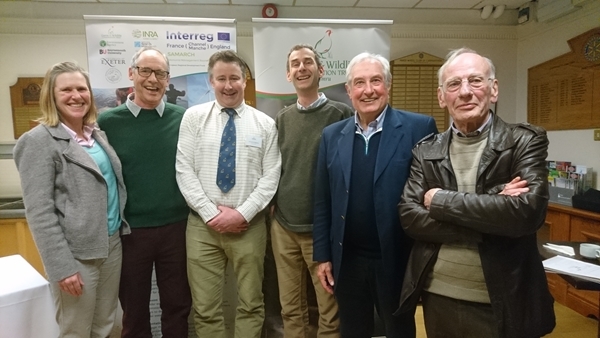
The GWCT team at the Ivy Bush Hotel in Carmarthen
SATELLITE tagging and ringing is enhancing our understanding of woodcock and sea trout - but support in Wales is needed for it to succeed.
That was the message from two leading biologists at the Game & Wildlife Conservation Trust who spoke during a talk in Carmarthen last week.
Andrew Hoodless, who is head of wetland research, and head of fisheries Dylan Roberts explained how the better-quality information now captured is critical in forming better sustainability policies in the future.
“Research using satellite tagging and ringing of woodcock over the past 10 years has greatly enhanced our understanding of both our wintering and resident breeding populations,” said Dr Hoodless.
Dylan, meanwhile, focused on his research into sea trout using small tags which has enabled his team to monitor the trend in the numbers returning to our rivers after spending time developing at sea.
Having described a steep decline, Dylan went on to show how influential SAMARCH – an EU multi-million-pound project that will provide crucial evidence to strengthen the protection of salmon and sea trout at sea – will be.
“Although this study, which uses special tags to record the depths and locations our sea trout population uses in the marine habitat, has only just begun, it suggests that wide-scale gill netting around our coast may explain the reason for the dramatic and worrying decline in sea trout numbers.”
Sea trout expert Graeme Harris contributed to the evening by using fishing licence return data to show how valuable sea trout are to Welsh anglers and local communities if managed responsibly.
Owen Williams, director of the Woodcock Network who is working closely with Andrew Hoodless, stressed how the passion of the woodcock shooting community and anglers was funding much of this research.
GWCT Cymru Chairman, Nick Williams concluded the evening by explaining how GWCT is focusing its attention on issues pertinent to biodiversity in Wales - and stressed how important a strong Welsh membership base is to this work.
To find out more about these species visit www.gwct.org.uk
Notes to editors
The Game & Wildlife Conservation Trust – providing research-led conservation for a thriving countryside. The GWCT is an independent wildlife conservation charity which has carried out scientific research into Britain’s game and wildlife since the 1930s. We advise farmers and landowners on improving wildlife habitats. We employ more than 60 post-doctoral scientists and other research staff with expertise in areas such as birds, insects, mammals, farming, fish and statistics. We undertake our own research as well as projects funded by contract and grant-aid from government and private bodies.
For information, contact:
Eleanor Williams
Telephone: 07592 025476
Email: press@gwct.org.uk